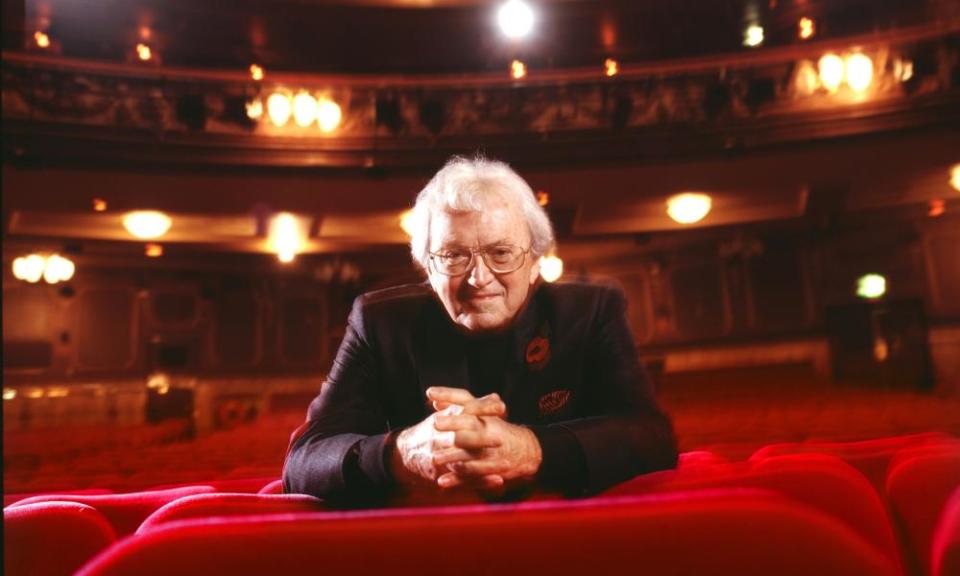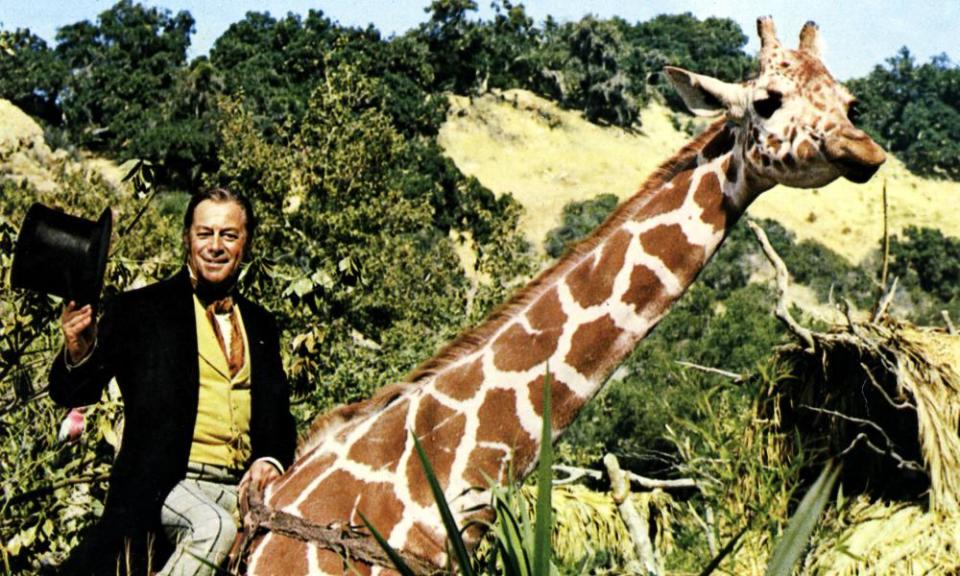Leslie Bricusse obituary

The songwriter Leslie Bricusse, who has died aged 90, was a quiet man with an unshakeable sense of his own worth, an outlook justly cultivated in the early 1960s when his two stage musicals with Anthony Newley, Stop the World – I Want to Get Off (1961) and The Roar of the Greasepaint – The Smell of the Crowd (1964), spawned songs that became standards recorded by Sammy Davis Jr (What Kind of Fool Am I?), Nina Simone (Feeling Good) and Tony Bennett (Who Can I Turn To?), as well as Newley himself.
Pop ballads and romantic torch songs were his speciality in a vast output including music and/or lyrics for more than 40 films and plays; he won his first Oscar for Talk to the Animals, sung, sort of, by Rex Harrison in the 1967 movie Doctor Dolittle, which he adapted from Hugh Lofting’s novels, and his second for his score for Blake Edwards’s Victor Victoria (1982) starring Julie Andrews.
Most critics of the 2013 Drury Lane version of Charlie and the Chocolate Factory agreed that the best song in the show was the one lifted from the 1971 Willy Wonka film starring Gene Wilder, Pure Imagination, one of 14 good songs written for that movie by Bricusse. Another of them, Candy Man, sung by Aubrey Woods, became another standalone hit for Davis.

Elements of cockney knees-up came into play in the 1970 musical film Scrooge starring Albert Finney, but the one song of Bricusse’s score most typical of that strain, and the best item altogether, Thank You Very Much, was in fact written by Newley with another writer, James Head. Newley played Scrooge on stage in Birmingham in 1972, eventually reaching the vast arena of the Dominion in London in 1976. Scrooge became a standard role for Tommy Steele for years on end from 2003, while a fine actor, Jasper Britton, scored a success in the role, and the show, at the Curve in Leicester in 2017.
Bricusse and Newley followed in the steps of Lionel Bart, whose Oliver! in 1960 kicked the British musical into the modern pop music era, and their shared cockney identity, as well as an affinity with Charles Dickens, was an important creative factor. Newley became a huge star, and Bricusse bonded (for a few years) with Bart to the extent of forming an LB club, the initials allowing honorary membership also to Lionel Blair and Lauren Bacall.

Newley was in effect Bricusse’s passport first to Broadway and then Hollywood, where Bricusse and his wife, the actor Yvonne Warren (stage surname Romain), whom he married in 1958, and whose film career peaked in Double Trouble (1967) with Elvis Presley, became lifelong friends of other British expats such as Roger Moore, Joan Collins, David Niven and Michael Caine.
Bricusse was born in Southfields, south-west London, into a family with no theatrical connections beyond those of his grandmother, who used to clean the front steps of the Apollo theatre in the West End. His father, Cedric, rose to the position of circulation manager on the Sunday Chronicle, his mother, Ann (nee Mills), had been a war widow and Cedric was her second husband. Seven years before Leslie arrived, the couple had a daughter, Patricia.
The family moved in 1933 to Pinner, Middlesex, where Leslie attended Canon Lane elementary school and won a scholarship to University College school in Hampstead. After two years of national service, he gained a place at Gonville & Caius College, Cambridge, in 1951 to study modern and medieval languages, and produced a musical, The Lady at the Wheel, with his contemporary, the future novelist Frederic Raphael.
As president of the Footlights, he co-wrote and appeared in the 1954 revue Out of the Blue, the first Cambridge revue to reach the West End, co-starring another contemporary, Jonathan Miller, acclaimed as a new Danny Kaye six years before Beyond the Fringe.
While Miller returned to medicine, for a while at least, Bricusse was spotted by the brilliant clown Beatrice Lillie, who hired him as her leading man for the revue An Evening with Beatrice Lillie at the Globe (now the Gielgud) in the same year. Lillie, whose son had died in the second world war, more or less adopted Bricusse, and catapulted him into the West End world of HM Tennent and the all-powerful Binkie Beaumont, and friends such as Edith Evans, Noël Coward and Gladys Cooper. He stooged in her sketches, played the piano and wrote new material, staying with Lillie for more than 400 performances.
Soon after this life-changing engagement, Bricusse heard Newley singing on a liner in the Indian Ocean and offered to come up with something for his next album. Like Bart, Bricusse and Newley wrote songs that fitted musical theatre and suited the hit parade. Stop the World had two more signature Newley numbers, Once in a Lifetime and Gonna Build a Mountain, while Roar of the Greasepaint, starring Norman Wisdom (the show went straight from a provincial tour to Broadway, Newley replacing Wisdom in the lead) had two break-out numbers tailored for the star and co-writer, Nothing Can Stop Me Now and A Wonderful Day Like Today.
In between these two hit shows, Bricusse wrote lyrics for Pickwick (1963) at the Saville theatre, adapted from Dickens by Wolf Mankowitz with a score by Cyril Ornadel and a big rosy star performance by Harry Secombe, raising the roof and climbing the charts with If I Ruled the World.
Writing lyrics for two Bond film title songs, Goldfinger (1964) and You Only Live Twice (1967), with music by John Barry and vocals by Shirley Bassey and Nancy Sinatra, made his name in Hollywood and Doctor Dolittle put him in the front rank. But his third theatre collaboration with Newley, The Good Old Bad Old Days (1972) at the Prince of Wales, which opened a few months after Jesus Christ Superstar, looked like a retread of old ideas.
A series of sketches – covering the French revolution, the American civil war and Broadway itself – were designed to show mankind in a good light to stop God destroying the world, and the score was curiously devoid of big numbers.
A 1976 television musical of Peter Pan did little to bolster the reputations of either writer, the music and lyrics of Bricusse and Newley containing one ingratiatingly half-memorable song, Once Upon a Bedtime, sung over the opening credits by Andrews, and one wanly beguiling item, Happiness Hill, that Newley himself rescued from banality in his recording of it. The film featured Mia Farrow as Peter, Kaye as Hook and John Gielgud as the narrator.
For Sherlock Holmes at the Cambridge in 1989 Bricusse wrote book, music and lyrics, inventing a revenge confrontation between a resurrected Holmes (Ron Moody) and his arch-enemy Moriarty’s daughter, Bella (Liz Robertson), but the show failed to take off, even in a 2013 revamp at the Hoxton Hall.
Victor Victoria was reworked as a Broadway musical in 1995 with a new collaborator, Frank Wildhorn, with Andrews and Tony Roberts leading the cast in the unfriendly Marquis theatre; Edwards’s staging was more dog’s dinner than beautiful banquet. One song, alas, was called Paris Makes Me Horny. And then Andrews lost her voice.
Bricusse had a much happier time with a staging of Doctor Dolittle at the Hammersmith Apollo in 1998. Steven Pimlott’s spectacular production starred Philip Schofield, with puppetry by Jim Henson and the regained, recorded voice of Andrews as Polynesia the parrot. The show ran for a year, then toured the UK to good business. Steele launched as Dolittle in a 2007 revival by the producer Bill Kenwright and, 10 years later, Mark Williams led another tour that opened at the Churchill theatre in Bromley in 2018.
Bricusse was appointed OBE in 2001 and published a superbly written autobiography, Pure Imagination, in 2005.
Although Leslie and Yvonne – known to everyone as Evie – separated for a while in the 70s, the marriage proved resilient and long-lasting. She survives him, as do their son, Adam, and two grandsons, Roman and Luca.
• Leslie Bricusse, songwriter, lyricist and composer, born 29 January 1931; died 19 October 2021

